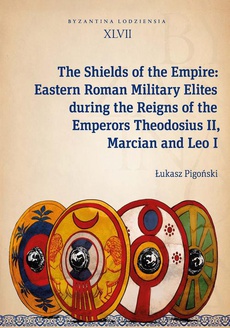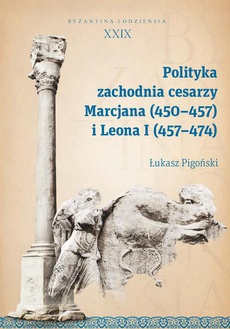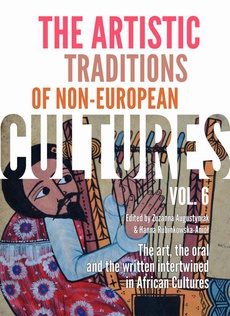INNE EBOOKI AUTORA
The Shields of the Empire: Eastern Roman Military Elites during the Reigns of the Emperors Theodosiu
Byzantina Lodziensia XLVII
Autor:
Wydawca:
Format:
epub, mobi, pdf, ibuk
When the emperor Valentinian III murdered the general Flavius Aetius, it has been observed that he had ‘cut his right hand with his left’, and the story of the fall of the ‘last Roman’ has been put in the greater context of the subsequent dissolution of the Roman Empire in the West. However, a similar deed committed by the emperor Leo in the East in 471, when he ordered the killing of the general Aspar, certainly did not gain such a legendary status. The underappreciated story of the survival of the Eastern Roman Empire in the turmoil of the fifth century is however no less dramatic, and the role that powerful military leaders played in those events was certainly paramount.
This publication aims to reconstruct the involvement of the Eastern Roman military elite in various matters of the state on the wider background of political history marked by the reigns of the emperors Theodosius II (408-450), Marcian (450-457), and Leo I (457-474). On its pages, the author presents the history of the numerous wars in which the Empire found itself entangled in during that uneasy time, as well as the periods of conflict and cooperation between the generals and the emperors. The focus is not only on the military elite as a group, but also on outstanding individuals, such as generals Plintha, Flavius Zeno, Aspar or Zeno-Tarasikodissa, the aforementioned emperors and their civilian advisors. The result is a comprehensive study and a novel interpretation of the nearly seven decades of turmoil that, contrary to what happened in the West, curiously did not result in the collapse of the Eastern Roman state; perhaps, as the author argues, in no small part due to those military leaders, who were serving and protecting it.
| Rok wydania | 2023 |
|---|---|
| Liczba stron | 242 |
| Kategoria | Historia wojskowości |
| Wydawca | Wydawnictwo Uniwersytetu Łódzkiego |
| ISBN-13 | 978-83-8331-095-4 |
| Numer wydania | 1 |
| Język publikacji | angielski |
| Informacja o sprzedawcy | ePWN sp. z o.o. |
POLECAMY
Ciekawe propozycje
Spis treści
| Introduction | 9 |
| Chapter I. The Military in the Fifth Century | 13 |
| Who Constitutes ‘Military Elites’? | 13 |
| An Overview of the Sources | 15 |
| The Roman Army | 20 |
| The Foederati | 23 |
| Commanding the Roman Army | 24 |
| The Prerogatives of Magistri Militum | 27 |
| Sources of Power and Influence | 29 |
| Chapter II. The Military Elite during the Reign of Theodosius II | 33 |
| The Regime of Anthemius | 34 |
| The Fall of Anthemius and the New Regime of Pulcheria | 40 |
| The War with Persia | 43 |
| The Campaign against the Usurper John | 49 |
| The First Vandal Expedition | 52 |
| Plintha and the Huns in the Twenties and the Thirties | 55 |
| The Second Vandal Expedition (441) | 60 |
| The Developments in the East | 64 |
| The War against the Huns of 441–442 | 65 |
| The Road to the Next War | 68 |
| The War of 447: A Conflict Shrouded in Mystery | 69 |
| The Course of the War | 71 |
| The Peace of 447 | 77 |
| The Straw that Broke the Camel’s Back: The Conflict over the Hunnic Question | 79 |
| The Curious Case of Berichus | 81 |
| The Developments of 448–450 | 83 |
| Conclusion | 85 |
| Chapter III. The Military Elite during the Reign of Marcian | 87 |
| The Perception of Marcian by his Contemporaries and in the Scholarship | 87 |
| Accession to the Throne… | 89 |
| … and Its Presentation | 90 |
| The Month of Power Struggle | 92 |
| Aspar’s Right Hand Man | 94 |
| All Marcian’s Men | 96 |
| The Wars of Marcian | 101 |
| The War of 452 | 104 |
| The Conclusion of the Hunnic Problem | 108 |
| The Northern Border and the Career of Procopius Anthemius | 111 |
| The Problem of the Vandals | 113 |
| The Eastern Policy of Marcian | 116 |
| The Arab Raids | 117 |
| The Blemmyes and Nobades | 118 |
| The Expeditions to Lazica | 119 |
| The Soldier Emperor | 121 |
| The Emperor of the Soldiers | 121 |
| The Puzzling Last Years of Marcian’s Reign | 122 |
| Conclusion | 126 |
| Chapter IV. The Military Elite during the Reign of Leo I | 127 |
| The Question of Succession | 127 |
| The Role of Aspar in the Succession | 129 |
| A Dangerous Precedent | 130 |
| Leo, the comes et tribunus Mattiariorum | 131 |
| The Influence of Aspar | 133 |
| Leo’s Own Ambitions | 134 |
| The Ostrogoths and Marcellinus of Dalmatia | 135 |
| Timothy Ailuros and the Religious Unrest in Alexandria | 138 |
| 463: the Birth of Leo’s Dynastic Ambitions? | 139 |
| Behind Every Great Man… The Role of Verina | 141 |
| The Turn to the West | 143 |
| The Arrival of Tarasikodissa and the Situation in the East | 145 |
| The Conflict between the Goths and the Sciri | 147 |
| The War with Dengizich | 149 |
| Aspar’s Opposition | 155 |
| The Expedition of Basiliscus | 156 |
| The Aftermath of the Defeat | 161 |
| The Campaign of Heraclius and Marsus | 163 |
| The Revolt of Anagastes | 166 |
| Aspar’s Return to Power | 169 |
| Leo the Butcher | 171 |
| A Pyrrhic Victory | 173 |
| Conclusion | 174 |
| Conclusion | 177 |
| Ethnicity: Solidarity and Division | 177 |
| Kinship and Family Matters | 180 |
| Faith and Religious Policy | 182 |
| The Question of Identity: Becoming Byzantine? | 183 |
| Closing Thoughts | 185 |
| Appendix 1 | 189 |
| The Question of the Illyrian Command | 190 |
| Tenures of Magistri Militum | 192 |
| Appendix 2 | 195 |
| List of Abbreviations | 201 |
| Bibliography | 203 |
| Primary Sources | 203 |
| Secondary Literature | 207 |
| Index of People | 217 |
| Index of Ethnic and Geographic Names | 223 |
| Abstract | 227 |
| Maps | 229 |


























